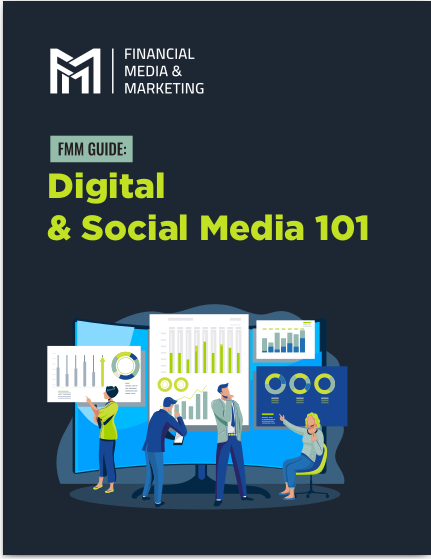Key Takeaways
-
Many financial advisors overlook the importance of digital engagement, but it is now a crucial part of lead generation.
-
Content marketing and social proof play a bigger role than ever in building trust and credibility with potential clients.
Why Traditional Marketing Alone No Longer Works
If you’re relying only on word-of-mouth referrals and old-school networking to bring in new clients, you’re probably missing out on a massive audience. In 2025, the financial advisory industry is more competitive than ever, and traditional marketing efforts alone won’t cut it. While personal referrals still hold value, digital strategies are now a necessity, not an option.
The Digital Shift in Financial Marketing
Over the last decade, financial marketing has evolved from cold calls and in-person events to a more digital-first approach. Today’s clients do their research before making decisions. They read online reviews, consume educational content, and follow financial experts on social media. If you don’t have a strong online presence, potential clients will move on to someone who does.
The Role of Trust in Digital Marketing
Since financial advising involves handling people’s hard-earned money, trust is everything. Without a digital footprint that showcases your expertise, transparency, and client satisfaction, you may struggle to convert leads into clients. An effective online strategy includes educational content, testimonials, and real engagement with your audience.
How to Strengthen Your Digital Presence
Building an effective digital presence requires a multi-pronged approach. Here are some key strategies:
-
Website Optimization: Ensure your website is professional, mobile-friendly, and contains clear calls to action.
-
SEO Strategy: Optimize your content for search engines so clients can easily find you.
-
Active Social Media Profiles: Engage with your audience on platforms like LinkedIn, Twitter, and Facebook.
-
Video Marketing: Short, educational videos can be a powerful way to connect with potential clients.
The Power of Niche Marketing in 2025
A generic marketing approach no longer delivers the best results. Niche marketing—targeting specific groups based on profession, age, or financial goals—is now essential for financial advisors looking to stand out.
Why Generalist Approaches Don’t Work
If you try to market to everyone, you risk being overlooked by those who want personalized advice. Instead, focusing on a specific niche allows you to craft messaging that directly speaks to your ideal clients’ needs and pain points. Whether you specialize in retirement planning for government employees or investment strategies for business owners, narrowing your audience can significantly improve your conversion rate.
Building Authority Within Your Niche
When you focus on a specific group, you have the opportunity to position yourself as an expert in that field. This means creating tailored content, speaking at industry-specific events, and networking within that niche community. Over time, you become the go-to advisor for that audience.
How to Identify Your Niche
Finding your niche requires assessing your strengths and understanding market demand. Consider the following:
-
Your Expertise: What areas of finance do you excel in?
-
Demographic Trends: Are there growing financial concerns in a particular age group or industry?
-
Client Needs: What specific problems can you solve better than your competitors?
Content Marketing: The Secret Weapon for Lead Generation
Content marketing isn’t just a trend—it’s the foundation of a strong digital marketing strategy for financial advisors. Well-crafted content helps you educate potential clients, build trust, and establish yourself as a thought leader in your industry.
What Types of Content Work Best?
Different forms of content can help you engage with different segments of your audience. Some of the most effective content strategies include:
-
Blog posts and articles that answer common financial questions
-
Educational videos that break down complex topics
-
Email newsletters that keep your audience engaged
-
Social media posts that showcase insights and expertise
-
Downloadable guides that provide in-depth financial advice
-
Webinars and live Q&A sessions that encourage real-time interaction
The Importance of Consistency
Posting one blog or video every few months won’t move the needle. Consistency is key. Whether you post weekly or biweekly, maintaining a regular content schedule keeps you top of mind for potential clients.
Measuring Content Performance
To ensure your content is effective, track key performance metrics such as:
-
Website traffic and engagement rates
-
Lead generation and conversion rates
-
Social media shares and comments
-
Email open and click-through rates
Social Proof and Client Testimonials: Your Digital Word-of-Mouth
People trust what others say about you more than what you say about yourself. This is why social proof—client testimonials, case studies, and online reviews—can be a game changer for financial advisors.
Leveraging Testimonials for Maximum Impact
Encourage satisfied clients to leave reviews on platforms where potential clients are looking, such as your website, Google, or LinkedIn. Use these testimonials in your marketing materials, on your homepage, and in your social media content.
The Role of Third-Party Validation
Beyond client testimonials, features in financial publications, guest appearances on industry podcasts, or awards in your niche can further validate your expertise. These third-party endorsements can make a big difference in convincing potential clients to trust you.
Responding to Negative Reviews
No one likes receiving negative feedback, but handling it professionally can boost your credibility. Responding thoughtfully and addressing concerns shows potential clients that you care about client satisfaction.
The Importance of an Automated Lead Nurturing System
If someone visits your website or follows you on social media, that doesn’t mean they’re ready to become a client. You need a system to nurture those leads over time until they’re ready to take action.
How Lead Nurturing Works
Lead nurturing involves staying in touch with potential clients through multiple touchpoints:
-
Email sequences that provide ongoing value
-
Retargeting ads that remind visitors of your services
-
Follow-up calls or messages to answer their questions
-
Personalized content recommendations based on their interests
Why Automation is Essential
You don’t have time to manually follow up with every lead, which is why automation is key. An automated system can keep your prospects engaged without requiring constant effort on your part.
Tools to Enhance Lead Nurturing
Some tools that can streamline your process include:
-
CRM platforms to manage client interactions
-
Email marketing software for automated sequences
-
Chatbots to answer common questions instantly
Why Financial Advisors Need to Adapt Now
The marketing landscape has changed, and financial advisors who fail to adapt risk falling behind. Whether it’s through niche targeting, content marketing, social proof, or automated lead nurturing, making these adjustments now will set you up for long-term success.










